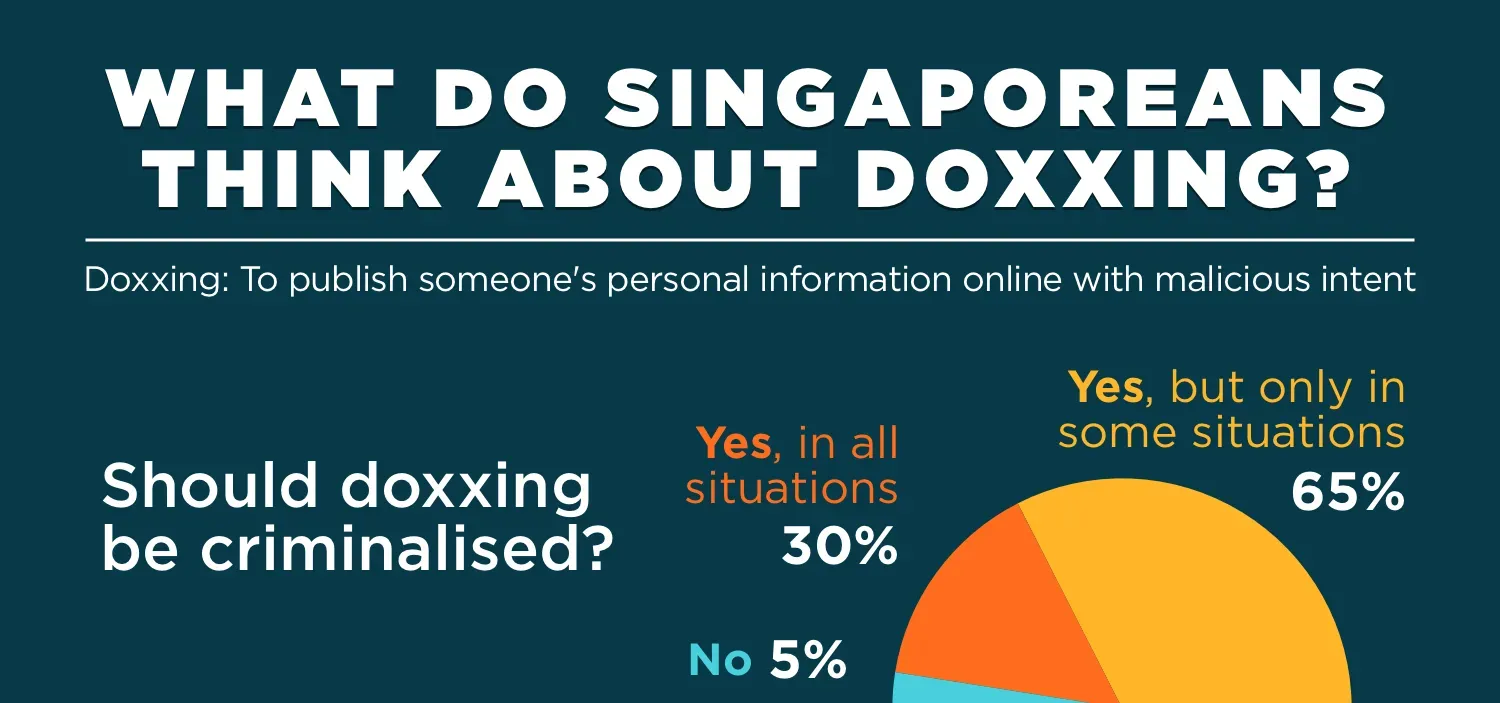Most Singaporeans Support the Criminalisation of Doxxing

Recently, proposed changes to the Protection from Harassment Act (Poha) was tabled in Parliament, which included the criminalisation of doxxing. Doxxing is to publish someone else’s personal information online with the intention to harass, threaten or facilitate violence against them.
While the Internet may offer anonymity, it is also a platform for personal information to be published and disseminated quickly. How then, do we prevent people from falling victim to doxxing? Who should be held responsible for the harassment faced by victims - the ones who published the personal information, or the ones who circulated it?
In a milieu survey conducted with 1,000 Singaporeans, weighted for age and gender, we find out people’s attitudes towards doxxing and online vigilantism.

Majority of Singaporeans support the criminalisation of doxxing

While some respondents had absolute opinions about the criminalising of doxxing, 65% think that some exceptions should be made. On the whole, a vast majority of Singaporeans (95%) are in favour of criminalising doxxing. .
We then probed further to find out why Singaporeans think that doxxing should or should not be criminalised.

The top three reasons for criminalising doxxing are as follows: Fairness of privacy protection for all (64%), doxxing is unfavourable as it feeds an unhealthy culture of online vigilantism (57%) and that the wrong people may be identified in doxxing attempts (56%).
Interestingly, a break-down of the top voted reason - the fairness of privacy protection for all - by age group, shows that there is no significant difference among 16-29 year olds, 30-44 year olds and those 45 years old and above. This is possibly a reflection of the importance of online privacy protection to many Singaporeans.
Meanwhile, the top three reasons for not criminalising doxxing are: Doxxing can deter future unlawful or undesirable acts (51%), people should know perpetrators’ identities to protect themselves (49%) and that doxxing is punishment for undesirable acts that are not legally punishable (42%).
From the results, it seems that Singaporeans believe that doxxing serves as an effective form of punishment. The omnipresent threat of having one’s personal information published online could possibly deter illegal or undesirable acts through self-policing. Additionally, desire for public participation in law enforcement seem to stem from two intentions - exacting justice as one deems necessary, and the right to knowledge so as to protect oneself.
Singaporeans support doxxing when the victim has committed a serious offence

More than two thirds of Singaporeans would not dox someone else should they encounter illegal or undesirable acts online, but to test the validity of their claims, we first questioned respondents on the GoJek “hostage” incident and NUS voyeurism incident. What were their thoughts on the publishing of the personal information of the two parties - GoJek passenger, Jovina Choi, and NUS peeping tom, Nicholas Lim - who received public condemnation for their behaviour?

Interestingly, 13% of those who claimed that they would not dox agreed that the GoJek passenger’s personal information should have been published. The number is even greater for the NUS peeping tom’s case, with a significant 34% of those who claimed not to dox agreeing to the publishing of his personal information.
What does the stark overall difference of 22% and 44% mean?
The contrast could be due to the severity of each case, for the GoJek passenger did not commit any criminal offence while the NUS peeping tom was found guilty of a serious sexual offence. Public dissatisfaction at the lack of severity of his punishment may also contribute to the justification of doxxing in this case, as Singaporeans felt that the consequences of his actions were inadequate compared to his crime. Also, people’s concepts of right and wrong are not all-encompassing. Depending on how we perceive the nature and severity of each situation to be, we oftentimes find grey areas in our judgements.
Singaporeans believe that publishing personal information is a more serious offence than circulating personal information
Harassment may stem from the very first act of publishing someone’s personal information, but do Singaporeans think that the people who circulated the information should also be held responsible?

Based on our results, the person who first published the personal information is largely believed to be responsible (83%). At the same time, a handful of respondents believed that people who circulate that information should be held responsible (34%).
Based on the responses, a simple click of the “share” button is not perceived to be an innocent one. Victims of doxxing could possibly face less harassment if their personal information had not been circulated widely.
The criminalisation of doxxing could be a positive step towards a healthier Internet culture, and most Singaporeans have shown their support for it. The fact that some Singaporeans believe in doxxing as a rightful punishment goes to show that more public education has to take place to encourage graciousness online.

.avif)





